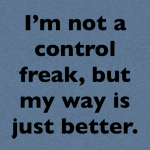 Once upon a time I was a control freak. I openly admit it now, although back then I was shocked when a good friend announced the fact to a group of strangers – and not in a jokey way. I had no idea that I was being controlling.
Once upon a time I was a control freak. I openly admit it now, although back then I was shocked when a good friend announced the fact to a group of strangers – and not in a jokey way. I had no idea that I was being controlling.
It’s easy to look around for people to blame, but I do thin part of my problem was that all the managers I had ever had,with one exception, had been of the command and control variety. When I started at Esso, just as Margaret Thatcher was coming to power, we talked about management of organisations, not leadership, and management meant getting people to do stuff.
Back then managers weren’t well educated in things managerial: there was a fair bit of research done at the time on how little management education British managers had.The idea that the best way to get people to perform well was to take a coaching approach hand’t even been thought of. Back then, control freakery was tolerated in managers, as was industrial bullying.
Fortunately things have changed, both for me personally and for industry as a whole. I’ve learned to give away control (it’s called delegation), and industry is much more aware of the fact that people are at their best when you inspire them, rather than push them relentlessly.
Yet there are still control freaks around in positions of power. From my perspective, this approach stems from a combination of poor role models and concealed fear. Most of the control freaks I have coached are secretly afraid that people will find out that they don’t really know what they are doing, or they are frightened of losing their job or getting demoted for failure. That’s the ones who can even see that they are control freaks.
Of course the ability to take control of a situation is important. Disorder tends to confuse people, and it’s well known in psychological circles that people instinctively look for a leader. If you are managing a group of people, and you’re not the leader, someone else is going to do the job for you. At the same time, you can lead successfully without controlling the living daylights out of those you are managing.
The tendency to over-control isn’t limited to men, either. I’ve only ever had one female boss, and she was OK, at least as far as the whole control question is concerned. However, I’ve coached female bosses who were inclined that way, and I have heard horror stories both from my coaching clients, and from friends about women who were clearly out of their comfort zone and their area of competence.
The remedy does lie in good education -and it’s one of the issues where personal coaching can really help. Control freaks rarely want to share their deepest insecurities in group situations.
So should control freaks be managers? In an ideal world, no. They won’t get the best out of people, and while they might get results in the short term, in the longer term, people will either vote with their feet and leave, or start to under perform or find ways to undermine the boss. At the same time, over-controlling managers need help – both to improve their own performance as a leader, and to create a better working environment for their staff.
As for me, my attitude nowadays is that I’m glad there are control freaks around clamouring for responsibility, so I don’t have to. I’m happy to step up when asked, and I’m a far better leader now I’ve got over this need to feel in control. This in turn comes from knowing who I am, and losing my insecurities about not being good enough. But control freaks have their place, and I am always happy to hand over to someone who enjoys putting order into the more mundane aspects of organisational life that are essential for their smooth operation.
